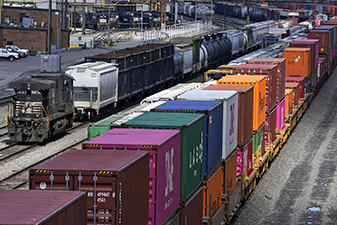|
By Cecile Entleitner, Associate, Blakey & Agnew
As we inch closer to the September 30 expiration of the FAST Act, Congress took several steps in June and July toward advancing new surface transportation reauthorization legislation. At the same time, the Senate is working to finalize a separate $1.2 trillion bipartisan infrastructure bill as well as a $3.5 trillion Democrat-only package.
Following the Senate Committee on Environment and Public Works' (EPW) bipartisan approval of a reauthorization bill in May, the Senate Committee on Commerce, Science, and Transportation also approved its portion, the Surface Transportation Investment Act, on June 16. The legislation, advanced by the Commerce Committee with bipartisan support by a vote of 25 to 3, provides $78 billion over five years for multimodal surface transportation, rail, freight, and safety programs. In addition to funding provided by the Senate EPW bill, the Surface Transportation Investment Act provides an average of $1.2 billion annually for the INFRA grant program and also increases the amount of funding available to multimodal projects. The legislation further includes $1.5 billion annually for the U.S. Department of Transportation's BUILD/TIGER/RAISE grant program, and creates a new program focused on highway, rail, and multimodal freight megaprojects – authorized at $2 billion annually. The bill would also establish a new Office of Multimodal Freight Infrastructure and Policy within USDOT and calls for updates to the National Freight Strategic Plan.
The remaining Senate Committees with jurisdiction over surface transportation policy and funding – the Committees on Finance and Banking, Housing, and Urban Affairs – have not yet released their respective portions of the legislation.
On July 1, the House passed their own five-year reauthorization proposal, titled the INVEST in America Act. The legislation was updated since its approval by the House Transportation and Infrastructure Committee in early June to incorporate provisions added by the House Energy and Commerce and Ways and Means Committees. The $715 billion legislation, of which approximately $547 would go toward surface transportation, passed the House by a vote of 221-201. The vote went almost entirely along party lines, though Republican Reps. Smith (R-NJ) and Fitzpatrick (R-PA) joined Democrats in support of the bill.
Concurrently, the White House continued its negotiations with Senators in an effort to reach an agreement on a separate infrastructure bill. On June 24, President Biden announced that the White House and a bipartisan group of Senators struck a deal on infrastructure investment. The agreed-upon eight-year, $1.2 trillion Bipartisan Infrastructure Framework provides $579 billion in new spending above current baseline levels, including: $109 billion for roads and bridges; $66 billion for passenger and freight rail; and $16 billion for ports and waterways.
|

The package's proposed pay-fors include repurposing unspent coronavirus relief funds and unused unemployment insurance, increased enforcement by the Internal Revenue Service to reduce tax evasion by corporations and the wealthy, public-private partnerships and bonds, and sales from the Strategic Petroleum Reserve, among other revenue sources.
Alongside the Bipartisan Infrastructure Framework, Democrats will also work to advance a larger Democrat-only bill. Senate Majority Leader Schumer (D-NY) recently announced the Senate Budget Committee agreed to a $3.5 trillion package, which will address priorities included in the Biden-Harris Administration's American Jobs Plan and American Families Plan, such as climate change and health care. To bypass a potential filibuster, Democrats intend to use the budget reconciliation process to pass this legislation by a simple majority vote. Democratic leadership will need unified support from both progressive and moderate Senators within the caucus to ensure the bill's passage. The Bipartisan Infrastructure Framework, on the other hand, will move forward through the regular order process, requiring the support of 60 Senators – including at least 10 Republicans.
When the bipartisan agreement was first announced, President Biden stated he would not sign the bill unless it was passed in conjunction with the Democrat-only package, though he later walked back these comments in response to Republican backlash. Several Republican leaders voiced opposition to the strategy of linking the two bills together, with Senate Minority Leader Mitch McConnell (R-KY) asserting that Democrats were attempting to "hold a bipartisan bill hostage over a separate and partisan process." In subsequent statements, Republican Senators have also expressed concerns regarding the Framework's funding mechanisms and questioned whether the proposed pay-fors will be sufficient to cover the new spending provisions.
Senators are currently working to resolve any remaining differences and draft legislative text for the two proposals. Senate Majority Leader Schumer intends to bring both the bipartisan infrastructure bill and a budget resolution for the larger reconciliation package to the Senate floor for a vote in July.
Blakey & Agnew, LLC is a public affairs and
communications consulting firm based in
Washington, DC.
|


